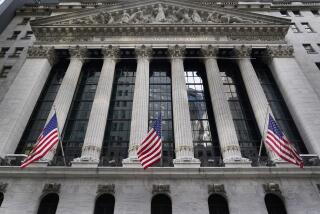Nikkei Index Falls to a 19-Year Low
TOKYO — Hopes that Japan’s decade-long bear market had ended were dashed again Tuesday as the country’s main blue-chip index plunged to a 19-year-low.
Renewed worries about the nation’s banking system helped send the benchmark 225-issue Nikkei index down 304.59 points, or 3.1%, to close at 9,217.04.
That was the weakest close since Sept. 19, 1983, and took the index under the low of 9,421 reached in February.
The Nikkei continued to slide today, falling 1.9% to 9,039.85 by early afternoon.
Shares of Mizuho Holdings Inc., Sumitomo Mitsui Banking Corp. and Mitsubishi Tokyo Financial Group Inc. were the hardest hit Tuesday as investors feared that economic uncertainty and rising bankruptcies could add to the massive bad-loan problems at the nation’s banks.
The drop in banks’ shares accelerated after Tokyo Gov. Shintaro Ishihara suggested that regulators had hidden the extent of Mizuho’s credit problems.
The city government said it may shift some of its $14.5 billion of public money to deposit accounts at foreign banks unless Mizuho and other Japanese banks prove their creditworthiness.
“We’re responsible for public money, taxpayers’ money, and we can’t just let it go up in smoke,” Ishihara said.
Ishihara attacked banking regulators, saying their inspections and subsequent actions on Mizuho were inadequate and “too lenient.”
“The worst part of all this is [regulators are] hiding things so they don’t lose face,” Ishihara said.
“Banks are getting caught in a vicious cycle,” said Shigemi Nonaka, chairman of Polestar Investment Management. “Slumping stocks are going to hurt bank shareholdings, and a further slowdown in the economy would delay bad loan write-offs.”
In a bid to calm the market, Finance Minister Masajuro Shiokawa said Japan always is monitoring stock and other financial markets to gauge what they are saying about the state of the economy. But he said there were no immediate plans to take measures to prop up faltering stocks.
Some investors reiterated concerns that the government still doesn’t have an effective plan to help banks deal with bad loans that have been on the books since the early 1990s.
The Nikkei index, which peaked at 38,915 in 1989, mostly traded between 13,000 and 20,000 in the 1990s, then dived below 10,000 in 2001. It rose as high as 11,979 in spring of this year before sinking again.
From its all-time high in 1989, the Nikkei has lost 76.3%. That was almost exactly the decline in the U.S. Nasdaq composite index from its peak in March 2000 to the five-year low reached Aug. 5.
More to Read
Inside the business of entertainment
The Wide Shot brings you news, analysis and insights on everything from streaming wars to production — and what it all means for the future.
You may occasionally receive promotional content from the Los Angeles Times.








